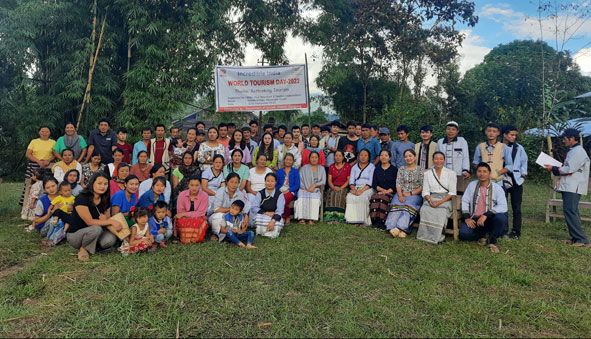[ Pisi Zauing ]
HAZOLO, 9 Oct: Aiming to transform the picturesque Vijaynagar valley in Changlang district into a sought-after tourist hotspot, the Changlang tourism department organised a tourism awareness programme in Hazolo village in Vijaynagar circle recently, with the theme ‘Rethinking Tourism’.
The programme was supported by Mugaphi Tours & Trek, SHG Hazolo, and other stakeholders.
Hazolo is a clean, beautiful and well-organised village, inhabited by the warm and hospitable Yobin/Lisu tribe. It has tremendous potential to become a popular destination for rural tourism.
Situated on a hilltop, overlooking a neighbouring Nepali village and the river downhill, Hazolo village consists of 40 households, with a population of about 250 people.
Known for being extremely skilled artisans and craftsmen, the villagers produce high quality handmade products.
During the programme, the villagers displayed various handcraft items, handlooms, traditional handmade items, agro-based products, local cuisine, etc. They also demonstrated the techniques of making dry grass mats, bows and arrows, as well as baskets.
Members of SHGs also presented their methodologies of making traditional rice cakes and unique hemp-woven textiles. Dances as well as traditional games and sports, among other activities, were also presented by the villagers.
Tourist Information Officer Khoda Yakang sensitised the villagers to tourism, homestay, hospitality, and cleanliness. He also educated the villagers on the need to conserve the rich flora and fauna, and to preserve their age-old culture and traditions.
Tour operators Yolisa Yobin and Yofuna Yobin shared their experience of handling clients and tourists, and urged their people to be tourist-friendly and hospitable.
Public leader Liakhu Yobin and Milina Yobin, speaking on behalf of Hazolo SHG, expressed gratitude to the department for organising the programme and imparting knowledge on the significance of tourism for economic and socio-cultural sustainability.




